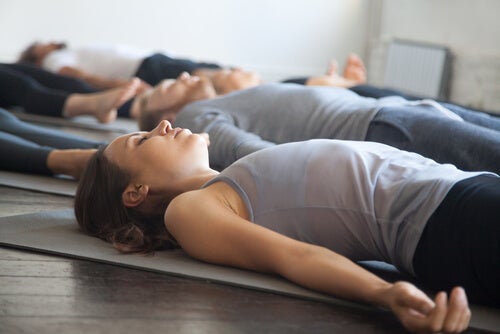Ten Difficulties with Relaxation Exercises

Experts believe that breathing and relaxation exercises can be great allies in the battle against anxiety, depression, and OCD. Although their benefits are numerous, you may struggle with the relaxation exercises you try out.
These challenges stop many people from reaching their goal of reducing psychophysiological activation. In this article, we’ll be talking about some of the problems that can arise when doing these exercises. Some of the specific techniques we’ll be talking about are Jacobson’s progressive muscle relaxation technique and Shultz’ autogenic training.
What’s progressive muscle relaxation?
Progressive muscle relaxation is a technique developed by Jacobson. You can find its historical antecedents in certain practices such as meditation and yoga.
Its main objective is to reduce psychophysiological activation, which allows for general body relaxation. Jacobson believed that the body is an interrelated whole. Thus, he also believed that different muscles send signals to your brain to extend this relaxation throughout the whole body.

Main objective: Deactivation of the sympathetic nervous system
The nervous system has two branches: the sympathetic and parasympathetic nervous systems. The sympathetic branch is involved in activation, whereas the parasympathetic branch is involved in relaxation. It’s not possible for both of the systems to activate synchronously. In other words, you can’t be tense and relaxed at the same time.
The goal of progressive muscle relaxation is to deactivate the sympathetic branch in order to activate the parasympathetic one. Relaxation produces two very important effects: a reduction in muscle tone and a slowing of breathing speed.
Training in relaxation
In order for progressive muscle relaxation to work, you need to train your body for it. You should aim to make it automatic for your body. Training involves exercises in which you tense and relax your muscles, one by one, for several seconds. You go through all of your muscle groups. First, you relax your arms, then your face, your neck, your stomach, and, finally, your legs.
Your ultimate goal is to eventually not have to go through the tensing-relaxing exercises at all. Your muscles should instead directly relax when you feel tension from nervousness or anxiety.
Nevertheless, problems might stem during your training that make the acquisition of this type of learning more difficult. Many people come to feel at some point that the exercises are worthless and give up on them entirely. On many occasions, during training sessions as well as in daily life, people want a way to relax so they can fulfill their obligations. In this article, we’ll tell you about the most common problems that can spring up on your path to meeting these goals.
It’s important to keep them in mind so you don’t give up. There are bodily reactions that may seem strange at first. Even so, once you take up these exercises, they’ll become normal to you.
Interruptions during exercises
- Difficulty concentrating on the exercises. Relaxation can be strange for the person starting out with it. It’s not uncommon for it to be challenging to maintain such a low state of energy. Experts recommend that you don’t give up. Little by little, “weird” will turn into “natural”.
- Movements. Small movements, whether you’re doing the exercises on a chair or in a bed, tend to be very common. If you just use them to get comfortable, scratch yourself, etc., then they won’t have any negative effect on reaching your goal. On the other hand, if these movements are happening constantly, it means that you’re not sufficiently relaxed.
- Frequent distressing thoughts. Although it’s best to practice cognitive control before going into relaxation training, many people don’t follow this order. In order to reduce these types of thoughts, you can try to practice relaxation with calming sounds. These may fill up your mind. It can also be helpful, within the context of group training or therapy, for the therapist’s own voice to keep you focused on the task. Mindfulness exercises are also very helpful for dealing with such distressing thoughts.
Embarrassment during relaxation exercises
- Fear related to closing your eyes. Some people don’t want to close their eyes during relaxation training. This is especially true when they’re being lead in a group setting. It may also be a problem in homes where it’s difficult to be alone at any given time. This is connected to the fear of loss of control. It’s important to understand that closing your eyes is a good idea so that the external world doesn’t distract you. Setting aside a few hours a day when you know you won’t be bothered can free you from feeling like you don’t have control over who could come and interrupt you.
- Hesitation when doing some exercises. If you aren’t doing your training sessions at home, or you perform them during therapy, you might feel embarrassed when doing certain tension-relaxation exercises. This may correct itself if the therapists does the exercises with the client without any reservations. Experts recommend that, at first, you do the exercises away from the sight of others if you feel embarrassed or shy.
- Laughter or conversation. Due to the discomfort that many people feel when they’re quiet around others, someone might laugh during the exercises. They might even speak out loud with other people if it’s a group session. Experts recommend that you refrain from laughing or speaking because this can break the dynamic of relaxation. If this happens during a session, experts recommend that the therapist control that behavior. If that doesn’t work, they should make whatever comment they have to.
Physical sensations
- Dizziness. Dizziness sometimes manifests when you train lying down. You can solve this issue by changing your posture and sitting up straight.
- Spasms and tics. They tend to take place when there’s a lot of tension going into the exercise. They’re a good sign since they mean that the relaxation is working.
- Muscle spasms. Muscle spasms can occur. These most commonly happen in the calves and in the feet. If those areas are problematic, experts recommend that you tense them for less time than you relax them. Experts also say that you shouldn’t try to connect the relaxation training with those types of spasms. If they’re especially bothersome, you should get up and walk for a short time before trying again. However, note that it can be counterproductive to stop the exercise and not give it another try.
- Internal activation (arousal). There are certain muscles that people can’t control volitionally. Muscular relaxation is only for those that are under your control. Nevertheless, note that these systems are certainly connected. If you keep practicing relaxation, you’ll also be contributing to less internal tension overall. That’s why it’s normal to feel some internal tension at the beginning even when your muscles are otherwise relaxed.

Normalization of strange sensations during relaxation exercises
Sometimes, these difficulties can hinder the day’s training. They can even scare people who may be starting to feel undesirable consequences from the relaxation exercises. But it’s all right not to be able to overcome a difficulty right away if you just don’t give up.
Finally, regarding strange sensations, you always have to remember that they’re normal. Little by little, as the body starts to get used to the relaxation exercises, they’ll disappear. These shouldn’t be a reason for you to lose hope. Neither should they become a source of negative thinking about how you’re doing something wrong.
Even though it might be hard, you should never give up on relaxation training. Experts recommend that you keep at it until you achieve control of your muscles and are able to relax at will.
All cited sources were thoroughly reviewed by our team to ensure their quality, reliability, currency, and validity. The bibliography of this article was considered reliable and of academic or scientific accuracy.
- González, A. y Amigo, I. (2000). Efectos inmediatos del entrenamiento en relajación muscular progresiva sobre índices cardiovasculares. Psicothema, 12(1), 25-32
This text is provided for informational purposes only and does not replace consultation with a professional. If in doubt, consult your specialist.








